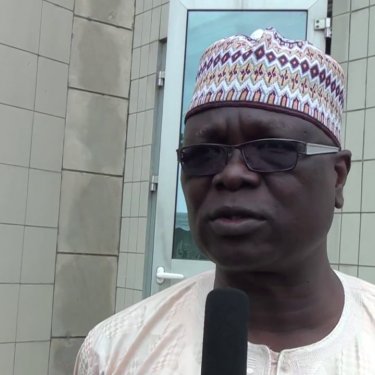Ailing Cameroonian journalist must be freed before it is too late

After visiting Amadou Vamoulké, the detained former director-general of Cameroon’s state-owned radio and TV broadcaster, CRTV, in prison, Reporters Without Borders (RSF) is alarmed by the continuing decline in his state of health and calls for him to be medevacked to receive the specialized hospital care he badly needs.
Held for the past three years and three months in Yaoundé’s Kondengui prison on an unsubstantiated charge of misusing state funds to benefit CRTV, Vamoulké is due to appear before Cameroon’s Special Criminal Court (TCS) for the 24th time today. At tomorrow’s hearing, the court is expected to rule on his lawyer’s request for his provisional release on the grounds of the extremely worrying deterioration in his health, which RSF saw for itself when it visited him in Kondengui prison. Vamoulké told RSF that he has “pains in both feet that keep him awake at night” and that he has received no treatment for the neuropathy, a condition affecting the peripheral nerves, that was diagnosed in September.
RSF has copies of the two medical reports issued in September, one by Yaoundé’s central hospital and the other by the American Hospital of Paris, that describe his neuropathy as “severe” and say he needs tests and treatment that are not available in Cameroon.
“In the absence of appropriate medical care, this journalist is reduced to treating himself with vitamins that he buys with his own money after reading online that they could help to relieve his pain, said Arnaud Froger, the head of RSF’s Africa desk. The authorities must free Amadou Vamoulké before it is too late. If the denial of medical care continues, he could lose the use of his legs. Regardless of the substance of the case, which has dragged on for years in the absence of evidence, the court has at the very least an obligation not to put this eminent journalist’s life in danger. His medical evacuation is a moral obligation.”
On 12 November, RSF used an emergency procedure to refer his case to the UN special rapporteur on torture and other cruel, inhuman or degrading treatment or punishment and to the UN Working Group on Arbitrary Detention, enclosing copies of the two medical reports.
In September, RSF referred Vamoulké’s detention to two special rapporteurs at the African Commission on Human and Peoples’ Rights – the special rapporteur on freedom of expression and access to information and the special rapporteur on prisons and conditions of detention.
CRTV’s director-general from 2005 to 2016, Vamoulké was arrested in July 2016 on a charge of misusing several millions of euros in state funds, not for personal ends but with the sole aim of benefitting CRTV. No evidence to support this charge has been produced at any of the 23 trial hearings so far held.
Vamoulké was the only African journalist nominated for this year’s RSF Press Freedom Prize. A staunch campaigner for the decriminalization of press offences in Cameroon and for opening up broadcasting to the private sector for the sake of diversity, Vamoulké was the first president of the Union of Cameroonian Journalists.
Cameroon is ranked 131st out of 180 countries in RSF’s 2019 World Press Freedom Index.



